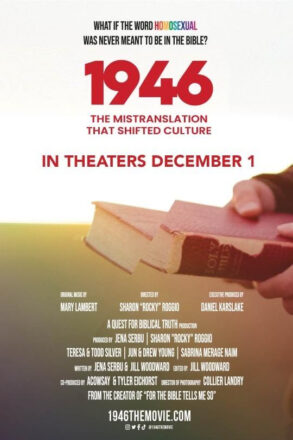1946: THE MISTRANSLATION THAT SHIFTED CULTURE
SETS GLOBAL DECEMBER RELEASE
Grammy Nominee Mary Lambert (‘Same Love’) Composed the Score for Award-Winning LGBTQIA+ Documentary on the Dubious Origin of
Anti-Homosexual Doctrine in the Bible
1946: THE MISTRANSLATION THAT SHIFTED CULTURE, directed by Sharon “Rocky” Roggio, will open in theaters in New York, Los Angeles and London starting December 1 after a festival run that captured over 20 awards including the Audience Award at the 2022 DOC NYC Film Festival and The Cleveland International Film Festival, Best of Fest at the 2023 edition of the Palm Springs International Film Festival, 2023 Hot Spring Docs Audience Award, and 2023 OUTfest LA’s Audience Award for Best Documentary. The film will premiere theatrically worldwide at the Village East Cinema in New York on December 1, at Laemmle Noho 7 in Los Angeles on December 1, and at London’s Prince Charles Cinema on December 3. Through this theatrical release, the film will qualify for Academy Award contention.
In 1946: THE MISTRANSLATION THAT SHIFTED CULTURE, Roggio combines personal experiences with thrilling historical exploration to uncover one of the greatest mysteries of our time, forever shifting our understanding of the Bible. The documentary follows the story of tireless researchers, Kathy Baldock and Ed Oxford, who trace the origins of the anti-gay movement among Christians to a grave mistranslation in the biblical text. They find that the Revised Standard Version, published in 1946 was the first time the word “homosexual” appeared in any Bible, in any translation. The documentary also chronicles the discovery of never-before-seen archives at Yale University which unveil astonishing new revelations, and casts significant doubt on any biblical basis for LGBTQIA+ bias.
Interwoven with this startling scriptural analysis is a story showing its human implications – Roggio’s own. Before her career as a filmmaker, Roggio grew up in a Christian household where her father, Pastor Sal Roggio, disapproved of her sexual orientation given his understanding of the Word of God. The unique and emotional narrative touch of including Sal in the film shows Rocky caught between the trauma of anti-gay prejudice and her genuine love for Sal, and her desire to keep him in her life, all while crafting a documentary around herself that aims to undermine his misguided ideology. Rocky and Sal’s story thus turns 1946 into a film not only about history and language, but about understanding and humanity, and through it Roggio takes her place in the growing movement of LGBTQIA+ Christians reconciling their identities with their faith – and those who would exclude them from it.
“Biblical literalism has led to the marginalization of innumerable human beings, not just within the LGBTQIA+ community. I hope this film starts the necessary conversations that rids this bad theology from the church and from our homes,” said Roggio. “We must address this mistake with compassion and consideration as often our loved ones are our oppressors and the perpetrators of persecution because of this misinformation. This isn’t just a film for me. It’s an act of mercy, of justice, and of empathy, not only for those involved in the creation of the film, but for those we interviewed, for the audience who will watch it, and for myself as well. It’s an act of Grace.”
Besides Roggio, the film also includes expert interfaith testimony from Reverend Dr. Cheryl Anderson (Professor Emer. of Hebrew Bible / Old Testament, Garrett–Evangelical Theological Seminary), Rabbi Steve Greenberg (Orthodox Rabbi), Reverend Dr. Angela Parker (Asst. Professor of New Testament Greek, Mercer University), Dr. Trevor W. Thompson (New Testament Greek Scholar), and Dr. David Potter (Professor of Greek and Roman History, University of Michigan). Roggio also served as a producer alongside Jena Serbu. Executive Producers include Todd and Teresa Silver, Daniel Karslake, Jun and Drew Young, and Sabrina Merage Naim. Grammy nominee Mary Lambert (‘Same Love’) composed the score for the film.
